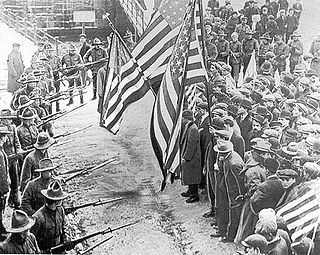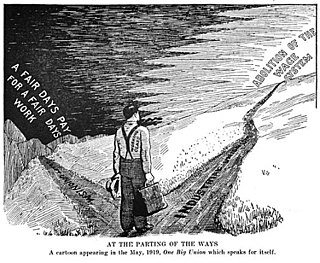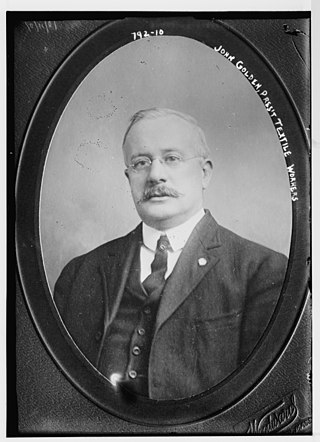
The Industrial Workers of the World (IWW), whose members are nicknamed "Wobblies", is an international labor union founded in Chicago in 1905. The nickname's origin is uncertain. Its ideology combines general unionism with industrial unionism, as it is a general union, subdivided between the various industries which employ its members. The philosophy and tactics of the IWW are described as "revolutionary industrial unionism", with ties to socialist, syndicalist, and anarchist labor movements.

Joe Hill, born Joel Emmanuel Hägglund and also known as Joseph Hillström, was a Swedish-American labor activist, songwriter, and member of the Industrial Workers of the World. A native Swedish speaker, he learned English during the early 1900s, while working various jobs from New York to San Francisco. Hill, an immigrant worker frequently facing unemployment and underemployment, became a popular songwriter and cartoonist for the union. His songs include "The Preacher and the Slave", "The Tramp", "There Is Power in a Union", "The Rebel Girl", and "Casey Jones—the Union Scab", which express the harsh and combative life of itinerant workers, and call for workers to organize their efforts to improve working conditions.

Franklin Rosemont (1943–2009) was an American poet, artist, historian, street speaker, and co-founder of the Chicago Surrealist Group. Over four decades, Franklin produced a body of work, of declarations, manifestos, poetry, collage, hidden histories, and other interventions.

William Dudley Haywood, nicknamed "Big Bill", was an American labor organizer and founding member and leader of the Industrial Workers of the World (IWW) and a member of the executive committee of the Socialist Party of America. During the first two decades of the 20th century, Haywood was involved in several important labor battles, including the Colorado Labor Wars, the Lawrence Textile Strike, and other textile strikes in Massachusetts and New Jersey.

Franklin Henry Little, commonly known as Frank Little, was an American labor leader who was murdered in Butte, Montana. No one was apprehended or prosecuted for Little's murder. He joined the Industrial Workers of the World in 1905, organizing miners, lumberjacks, and oil field workers. He was a member of the union's Executive Board when he was murdered and lynched.

The Lawrence Textile Strike, also known as the Bread and Roses Strike, was a strike of immigrant workers in Lawrence, Massachusetts, in 1912 led by the Industrial Workers of the World (IWW). Prompted by a two-hour pay cut corresponding to a new law shortening the workweek for women, the strike spread rapidly through the town, growing to more than twenty thousand workers and involving nearly every mill in Lawrence. On January 1, 1912, the Massachusetts government enforced a law that cut mill workers' hours in a single work week from 56 hours, to 54 hours. Ten days later, they found out that pay had been reduced along with the cut in hours.

The Industrial Worker, "the voice of revolutionary industrial unionism", is the magazine of the Industrial Workers of the World. It is now released quarterly. The publication was printed and edited by union labor, and frequently distributed at radical bookstores, demonstrations, strikes, and labor rallies. It covers industrial conditions, strikes, workplace organizing experiences, and features on labor history. It used to be released as a newspaper.

Joseph James "Smiling Joe" Ettor (1885–1948) was an Italian-American trade union organizer who, in the middle-1910s, was one of the leading public faces of the Industrial Workers of the World. Ettor is best remembered as a defendant in a controversial trial related to a killing in the seminal Lawrence Textile Strike of 1912, in which he was acquitted of charges of having been an accessory.
"Hallelujah, I'm a Bum" is an American folk song that responds with humorous sarcasm to unhelpful moralizing about the circumstance of being a hobo. The song's authorship is uncertain, but according to hobo poetry researcher Bud L. McKillips, the words were written by an IWW member. Carl Sandburg collected the song for his anthology The American Songbag, and he wrote that it was "heard at the water tanks of railroads in Kansas in 1897 and from harvest hands who worked in the wheat fields of Pawnee County, was picked up later by the I. W. W.'s, who made verses of their own for it, and gave it a wide fame." Some verses may have been written by a Kansas City hobo known only as "One-Finger Ellis," who scribbled it on the wall of his prison cell in 1897. There is also a questionable theory that Harry McClintock, an IWW member, could have written it in 1899 when he was only fifteen.
The San Diego free speech fight in San Diego, California, in 1912 was one of the most famous class conflicts over the free speech rights of labor unions. Starting out as one of several direct actions known as free speech fights carried out across North America by the Industrial Workers of the World, the catalyst of the San Diego free speech fight was the passing of Ordinance No. 4623 that banned all kinds of speech in an area that included "soapbox row" downtown. Clashes with the police in the area led to riots, multiple deaths including the deaths of police officers, vigilantism, and the retaliatory kidnapping and torture of notable socialists, including Emma Goldman's manager Ben Reitman. As a direct result of the aftermath of this fight, the neighborhood of Stingaree was razed to the ground and the obliteration of San Diego's Chinatown.
Free speech fights are struggles over free speech, and especially those struggles which involved the Industrial Workers of the World and their attempts to gain awareness for labor issues by organizing workers and urging them to use their collective voice. During the World War I period in the United States, the IWW members, engaged in free speech fights over labor issues which were closely connected to the developing industrial world as well as the Socialist Party. The Wobblies, along with other radical groups, were often met with opposition from local governments and especially business leaders, in their free speech fights.
Wobbly lingo is a collection of technical language, jargon, and historic slang used by the Industrial Workers of the World, known as the Wobblies, for more than a century. Many Wobbly terms derive from or are coextensive with hobo expressions used through the 1940s.

Anna LoPizzo was an Italian immigrant striker killed during the Lawrence Textile Strike, considered one of the most significant struggles in U.S. labor history.

The Industrial Workers of the World (IWW) is a union of wage workers which was formed in Chicago in 1905 by militant unionists and their supporters due to anger over the conservatism, philosophy, and craft-based structure of the American Federation of Labor (AFL). Throughout the early part of the 20th century, the philosophy and tactics of the IWW were frequently in direct conflict with those of the AFL concerning the best ways to organize workers, and how to best improve the society in which they toiled. The AFL had one guiding principle—"pure and simple trade unionism", often summarized with the slogan "a fair day's pay for a fair day's work." The IWW embraced two guiding principles, fighting like the AFL for better wages, hours, and conditions, but also promoting an eventual, permanent solution to the problems of strikes, injunctions, bull pens, and union scabbing.
The Agricultural Workers Organization (AWO), later known as the Agricultural Workers Industrial Union, was an organization of farm workers throughout the United States and Canada formed on April 15, 1915, in Kansas City. It was supported by, and a subsidiary organization of, the Industrial Workers of the World (IWW). Although the IWW had advocated the abolition of the wage system as an ultimate goal since its own formation ten years earlier, the AWO's founding convention sought rather to address immediate needs, and championed a ten-hour work day, premium pay for overtime, a minimum wage, good food and bedding for workers. In 1917 the organization changed names to the Agricultural Workers Industrial Union (AWIU) as part of a broader reorganization of IWW industrial unions.
Philip Josephs was a Jewish anarchist, anti-militarist, radical bookseller and tailor active in the New Zealand labour movement. He was a member of the Wellington branch of the New Zealand Socialist Party, ran their economics class and contributed to their paper, the "Commonweal". He helped revive the Anti-Militarist League in Wellington in 1912, and was elected secretary. On 9 July 1913 he helped launch New Zealand's first anarchist collective, Freedom Group, which lasted for a year. He was arrested during a police raid for possessing banned literature in 1915.

Ernest Riebe was a German-American cartoonist and a member of the Industrial Workers of the World (IWW), who was known for the slapstick humor he used in his comic strips. He is best remembered for his comics series Mr. Block.

John Golden was an American textile worker and trade union leader. He was elected president of the United Textile Workers of America (UTW) each year from 1902 until shortly before his death in 1921. At the time of his death, he was declared as important to textile unionism as John Mitchell was to mining unionism.

Mattie Lubchansky is a cartoonist and illustrator from the United States, who specializes in satirical comics about American politics. Lubchansky is non-binary and uses they/them pronouns since 2017.















